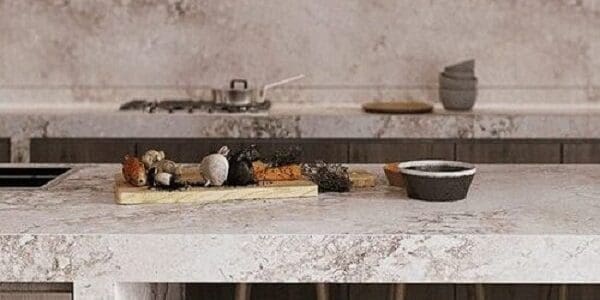
What should you choose? Let’s go over a little bit about each one so you can better decide which would suit you best.
QUARTZ
Quartz countertops are also known as Engineered stone countertops to differentiate them from natural stone countertops. Most are made from a high concentration of quartz crystals, a natural substance.
Quartz countertop manufacturers are continually adding new colors and patterns many of which are distinctly unique and very attractive. Quartz, and slab granite may look alike, at least at first glance.
Only when you get close to the material, feel it, and start to use it do you begin to learn the differences. Each countertop material has qualities that may work better or less well for your own situation.
Pros: Quartz has a wider variety of colors available than natural stone, since pigments can be added to the resin. It is hard and durable, and less prone to denting or chipping than quartzite. It also requires very little maintenance, if any.
Cons: Quartz can be scratched, and it melts under temperatures higher than 300 degrees Fahrenheit, which means a hot pad must be used.



GRANITE:
You probably already know that Granite is a natural stone countertop material which has been highly prized in the kitchen for many, many years.
Granite countertops are becoming more and more common thanks to their increased availability and affordability.
High-end granite colors will be more expensive but the average cost of installation for many common granite colors is about the same now as Corian.
Granite enjoys a greater “prestige” due to it’s natural uniqueness and is, therefore, typically perceived as having greater value in the minds of most homeowners and buyers.
- Granite offers almost unlimited choice in colors and patterns.
- Granite is heat, scratch, dent and chemical resistant. Almost impossible to damage in these ways.
- Granite is also chemical resistant, but requires sealing for optimum stain-protection.
- Granite will have visible seams on most countertops.
Granite can be expensive, depending on the size, color, thickness, pattern of the granite slab, and manufacturer/supplier. It is also labor-intensive because it is so heavy, which means that it may require additional structural support than what your counters already offer. It must be sealed roughly every 10 years or so to prevent staining, and it can crack if hit by a large, heavy object.
Pros: Because granite is highly sought after and considered beautiful, the countertops will add non-depreciating value to your home. It is non-porous and sanitary, heat-resistant, and easy to clean. It does not get scratched easily.
Cons:
Granite is very difficult to remove, and should be considered a “forever” upgrade, because you may have to rip out the entire counter if you get sick of it. It is expensive when compared to other common countertop materials.



SOLID SURFACE
Originally invented by DuPont in the 1960s and marketed under the brand name Corian, solid surface countertops are made from acrylic and polyester blends. They were originally intended to mimic the look of natural stone, while being stronger and non-porous.
When DuPont’s patent expired in the 1990s, a wave of different solid surface materials entered the market, including LG Hi-Macs, Staron, Hanex, Wilsonart, and Durat, amongst others. These brands mostly use the same recipe – DuPont’s original – but differ in the colors they offer.
Pros: Solid surface countertops offer a wider range of colors and looks than any other material, although none of them are particularly natural looking. They are very inexpensive compared to other countertop materials. They are also extremely low maintenance, not requiring sealants or special cleaning materials.
Cons: Solid surface countertops are not heat-resistant and can burn. They are also vulnerable to scratches and dents. However, they are repairable if damaged. Also, you cannot purchase solid surface countertops directly yourself, so no DIY here: you must go through a licensed dealer and have them professionally installed.



The best choice for you really comes down to what properties are most important to your family, home, and project.